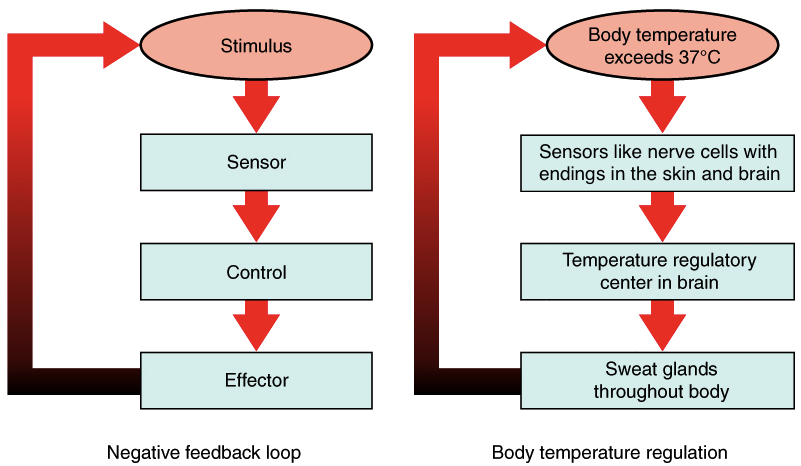Introduction
The excretory system works as the balance to the digestive system. While food and drinks are consumed for body nourishment and energy provision, the excretory system makes sure homeostasis is maintained regardless of the nutrition value of food.
The excretory system, therefore, regulates adequate salt and water levels, thus regulating the body fluid balance. In the case of excess water, through the production of hypotonic urine, water is removed. In cases of high consumption of salty foods or water loss through respiration, urine concentration is increased for the preservation of the osmolarity of body fluids.
Homeostasis.
This is the process/tendency to resist change to maintain a stable and constant internal environment of an organism’s body.
It uses negative feedback loops to counteract various property changes from given setpoints. Contracting to negative feedback loops, positive feedback loops are used to amplify the initiating stimuli.
Maintenance of homeostasis.
Homeostasis is dependent on the body’s ability to detect and oppose changes in the body. For instance, during exercise, the body muscles increase heat production, raising the body temperature. With the involvement of negative feedback loops that act for opposing stimulus, the body acts to bring changes back towards the set point for example, when body temperature rises, negative feedback loops brings it back to the setpoint value of 98.6∘F. the body first detects high temperature by sensors in the skin and brain which is relayed to the control centre in the brain. The control centre processes the information to activate effectors like sweat glands, which oppose the stimulus to bring the temperature of the body down.

The body temperature may also drop below the set point. Therefore homeostatic circuits do involve at least two negative feedback loops whereby one is used temperature is above the setpoint while the other actsivated when the temperature is below the set point.
Disruptions of Homeostasis.
Disruptions of feedback disrupthomeostasis. When feedbacks in the human body are disrupted, diseases may arise; for instance, diabetes.
Diabetes is a disease that is caused by a broken feedback loop of the hormone insulin, making it hard for the body to reduce high blood sugar down to a healthy level.
Blood sugar levels are controlled by two hormones, namely insulin, and glucagon. Insulin reduces the concentration of glucose in the blood by converting it to glycogen, a storage molecule in the liver. Glucagon raises the level of glucose in the blood. It acts on the liver to break glycogen into glucose and release it the bloodstream thus raising the sugar levels.
Other functions of the excretory system.
- Eliminates waste products, for instance, uric acid, urea, and ammonia.
- Maintains the osmotic level of plasma and blood.
- Helps in the maintenance of electrolyte balance of the body.
- Useful in the metabolism of drugs that do not metabolize in the liver.